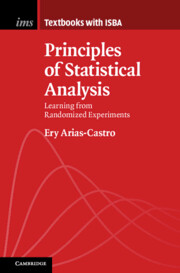Book contents
- Frontmatter
- Dedication
- Frontmatter
- Contents
- Preface
- Acknowledgements
- Part I Elements of Probability Theory
- Part II Practical Considerations
- Part III Elements of Statistical Inference
- 12 Models, Estimators, and Tests
- 13 Properties of Estimators and Tests
- 14 One Proportion
- 15 Multiple Proportions
- 16 One Numerical Sample
- 17 Multiple Numerical Samples
- 18 Multiple Paired Numerical Samples
- 19 Correlation Analysis
- 20 Multiple Testing
- 21 Regression Analysis
- 22 Foundational Issues
- References
- Index
20 - Multiple Testing
from Part III - Elements of Statistical Inference
Published online by Cambridge University Press: 22 July 2022
- Frontmatter
- Dedication
- Frontmatter
- Contents
- Preface
- Acknowledgements
- Part I Elements of Probability Theory
- Part II Practical Considerations
- Part III Elements of Statistical Inference
- 12 Models, Estimators, and Tests
- 13 Properties of Estimators and Tests
- 14 One Proportion
- 15 Multiple Proportions
- 16 One Numerical Sample
- 17 Multiple Numerical Samples
- 18 Multiple Paired Numerical Samples
- 19 Correlation Analysis
- 20 Multiple Testing
- 21 Regression Analysis
- 22 Foundational Issues
- References
- Index
Summary
In a wide range of real-life situations, not one but several, even many hypotheses are to be tested, and not accounting for multiple inference can lead to a grossly incorrect analysis. In this chapter we look closely at this important issue, describing some pitfalls and presenting remedies that `correct’ for this multiplicity. Combination tests assess whether there is evidence against any of the null hypotheses being tested. Other procedures aim instead at identifying the null hypotheses that are not congruent with the data while controlling some notion of error rate.
- Type
- Chapter
- Information
- Principles of Statistical AnalysisLearning from Randomized Experiments, pp. 309 - 328Publisher: Cambridge University PressPrint publication year: 2022

